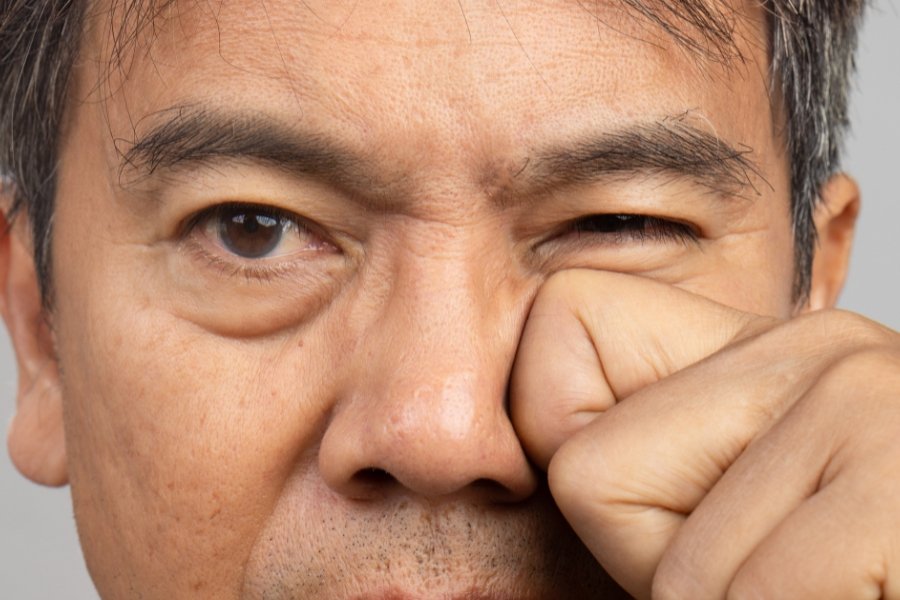You’re just sitting there living your life when all of a sudden your eyelid starts going haywire. It’s kind of a twitch, but more like a rapid pulsing or a fluttering—almost as if a tiny creature were trying to pound its way through the skin around your eye.
Not the most appealing visual, I know, but most of us have experienced those annoying eye twitches at some time and been baffled by them. Some of us may even have them on a regularly basis due to causes we either haven’t pinned down or addressed. (I recently tried out monovision contact lenses for the first time and my eyelids twitched like mad for a week, which my optometrist confirmed was due to eye strain from my vision trying to adjust.)
Those pulsing twitches are known as facial myokymia, and the primary reasons for it were broken down by Dr. Joe, MD, an ER doctor who shares health information on his social media channels.
“Have you ever had this?” he asked, showing a video of someone’s lower eyelid pulsing. “This is something called facial myokymia and it’s a persistent twitching of one of the muscles around your eye. The common causes associated with this include too much caffeine, stress, anxiety, poor sleep, dehydration, and some electrolyte problems.” According to the Mayo Clinic, other common causes of eye spasms include alcohol intake, bright light, fatigue, nicotine, wind or air pollution, dry eyes, or other irritation of the eyes.
Dr. Joe said that the condition is usually harmless, which is true. However, on rare occasions eye twitching can be a symptom of a potentially serious condition. If eye spasms are persistent, it’s a good idea to talk to your doctor about it.
How do you know when it’s time to see a doctor about an eyelid twitch?
What does “persistent” mean when it comes to eyelid spasms? Are we talking hours, days, weeks, months?
The Mayo Clinic says eye twitching usually goes away on its own within a few days or weeks with enough rest, stress relief and decreased caffeine, but you should schedule an appointment to consult with your doctor if:
- The twitching doesn’t go away within a few weeks.
- The affected area feels weak or stiff.
- Your eyelid completely closes with each twitch.
- You have difficulty opening the eye.
- Twitching happens in other parts of your face or body as well.
- Your eye is red or swollen or has discharge.
- Your eyelids are drooping.
Some cultures assign meaning to eye twitches
People have tried to explain the unexplainable for millennia, which has resulted in various meanings being assigned to random eye twitches across different cultures.
According to All About Vision, in many cultures, a twitch in the left eye is often said to mean something bad is going to happen, while a right eye twitch indicates something positive will. For instance, in the Caribbean, a left eye twitch means someone is talking badly about you or that a friend is in trouble. A right eye twitch means someone is talking positively about your or that you might reunite with an old friend soon. However, the opposite is true in China—left means good and right means bad (except it might depend on the time of day as the meaning gets calculated with the Chinese zodiac and almanac).
In some parts of Africa, a spasm in your upper lid might mean an unexpected arrival and twitching in the lower lid means something will happen to make you cry. n India, a twitch might mean good or bad news, losing or gaining money or even a child being born, depending on where the twitching takes place.
What can you do to stop eye twitches?
Unfortunately, there doesn’t seem to be much you can do once a spasm starts. One recommendation is to apply a warm compress to the eye to relax the muscles, but most of the tips for stopping myokymia come down to prevention.
Reduce stress and engage in more stress-relieving activities. Avoid drinking too much caffeine. Get enough sleep—even napping can help minimize eye twitches. Stay hydrated. Keep your eyes lubricated with drops if they tend to get dry. Basically, all of the things that contribute to overall health can help prevent eye twitches along with caring for your dry eyes.
So if your eyelid starts wigging out on occasion, don’t be alarmed, but do see it as a sign that you may want to adjust some of your health habits. (And, of course, consult a doctor if they truly become problematic in your life.)


































